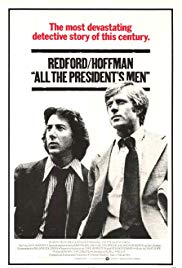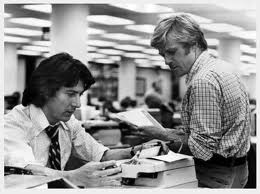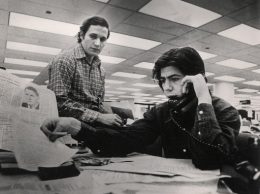Most questions asked on the background information worksheet are appropriate for discussion. The following questions are not addressed in the worksheet.
1. What might have happened had Nixon and his aides succeeded in their efforts to cover up their illegal conduct in the 1972 election?
Suggested Response:
This question calls for speculation, and all answers that can be supported are acceptable. Here are some valid points: President Nixon had already undermined the 1972 Presidential election by ensuring that candidates (like Senator Ed Muskie of Maine) who Nixon feared could beat him in the general election would not be nominated by the Democrats. Nixon had an “enemies list” and was using agencies of the federal government such as the IRS to go after them. Nixon and his aides would have continued to find ways to undermine the democratic process in the U.S.
2. The U.S. and state governments have taken the position that reporters must disclose their confidential sources when called to testify to a grand jury or in a trial. Had Woodward and Bernstein been forced to identify their sources in the Watergate scandal, what would have happened?
Suggested Response:
All answers that are logical and can be supported are acceptable. Here is a likely scenario. A judge, following the law, would have ordered them to testify. Bernstein and Woodward would have refused to obey and eventually they would have been sent to jail or fined or both for contempt of court. They would have been kept in jail until either they decided to testify or the grand jury was dismissed. If they had been called to testify at a trial, they might have been held until the case was over. They could also have been prosecuted for criminal contempt of court or for obstruction of justice. This could have stopped the disclosure of the criminal activity of President Nixon and his aides. It could have intimidated other reporters from working on the story. If they had disclosed their sources, it would have discouraged other people from coming forward and giving information to reporters.
3. One of the reporters involved in the breaking of the story of the Watergate scandal said that the important thing wasn’t that they brought down the President of the United States. The important thing was that they made the system work. Do you agree or disagree? Support your position.
Suggested Response:
All opinions that are logical and can be supported are acceptable. Here are some thoughts on the question. Richard Nixon was just one president in one period of time. However, the idea that the President is not above the law is an enduring principle which was served by the reporters’ actions.
4. What are the differences and the similarities between President Nixon’s actions in the Watergate scandal and President Trump’s efforts to overturn the results of the 2020 election?
Suggested Response:
There is no one correct answer to this two-part question and we are still learning about President Trumps illegal actions. All well-supported responses acceptable. The following is presented merely to serve as a basis for discussion. Nixon committed several felonies and tried to influence the outcome of an election. He and his henchmen committed many crimes and induced other agencies of government such as the CIA, the FBI, and the Justice Department to participate in the wrongdoing. His actions clearly constituted an egregious betrayal of the trust that had been placed in him by the people.
As for Trump, as this Learning Guide is being written, the full extent of this actions have not yet been exposed. However, we do know that:
(1) he pressured Vice President Mike Pence to violate the Constitution, the vice president’s oath of office, and federal law by refusing to accept the electoral college votes on January 6 (fortunately, Vice President Pence resisted this pressure); (2) he pressured other public officials, such as the Georgia Secretary of State, to betray their oaths of office and violate state statutes to “find” votes for him that didn’t exist (fortunately, the state officials resisted this pressure); (3) he maintained “the big lie” that the election had been stolen from him when he knew it wasn’t true and he had no evidence to support his claims; (4) many of the January 6 insurrectionists, who came to the Capitol directly after being addressed by Trump and others in a “Stop the Steal” rally, believed they were acting on his instructions and (5) President Trump delayed in asking the rioters to leave the capital and delayed efforts to protect the Congress putting the lives of Mike Pence, Nancy Pelosi and Capitol police officers in danger. He contributed to the deaths of several persons (police officers and one protester), to injuries for many others, and to the breaching of the Capitol by hostile forces for the first time since 1812. Trump is protected by blindly loyal Republican politicians who protect him from conviction and an ardent, and equally blind, political base. Many Republican politicians of 2020 – 2022 care more about power than they do about the Constitution. As Liz Cheney stated on June 9, 2022, at the first hearing of the January 6 House select committee, “I say this to my Republican colleagues who are defending the indefensible, there will come a day when Donald Trump is gone, but your dishonor will remain.” President Trump contributed to and then failed to take prompt action to stop an armed insurrection, violated his oath of office by failing to preserve, protect and defend the Constitution, attacked the democratic process at its very core by, for the first time, not cooperating in the peaceful transfer of power, and failed to take care that the laws be faithfully executed.
5. What are the differences and the similarities between President Nixon’s actions in the Watergate scandal, the actions of President Trump after he lost his bid for reelections, and President Clinton’s actions in the Monica Lewinsky scandal?
Suggested Response:
There is no one correct answer to this two-part question. All well-supported responses are acceptable. The following is presented merely to serve as a basis for discussion. For a description of President Nixon’s actions and those of President Trump, see the suggested response to the preceding questions.
President Clinton took sexual advantage of a subordinate and then committed perjury by lying about his actions in a deposition in a civil case. Clinton’s wrongful actions were isolated to the one area of sexual activity. These actions were reprehensible but they did not implicate Clinton’s core duties as President, nor did they directly attack the democratic process as did the actions of Presidents Nixon and Trump. Unlike Nixon and Trump, Clinton had not sought to implicate government agencies in his wrongdoing. There was a perception that the effort to impeach President Clinton was partisan, i.e., the Republican leaders wanted President Clinton out of office because they disagreed with his policies, not so much from any abhorrence of his actions. Note that during the time the Republican-dominated Congress was trying to impeach President Clinton, two Congressional leaders were forced to resign their posts and retire from politics because of their own sexual misconduct.
6. President Ford was appointed to be Vice President by Richard Nixon on December 6, 1973, when the Watergate Scandal was already rocking Nixon’s administration. Some have charged that Mr. Ford was required to promise to pardon Nixon. President Ford adamantly denied that there was any quid pro quo that he would pardon Nixon. In his pardon of Nixon, President Ford stated that:
It is believed that a trial of Richard Nixon, if it became necessary, could not fairly begin until a year or more has elapsed. In the meantime, the tranquility to which this nation has been restored by the events of recent weeks could be irreparably lost by the prospects of bringing to trial a former President of the United States. The prospects of such trial will cause prolonged and divisive debate over the propriety of exposing to further punishment and degradation a man who has already paid the unprecedented penalty of relinquishing the highest elective office of the United States.
Do you think that the pardon of former President Nixon was the best policy?
Suggested Response:
There is no one correct answer to this question. A number of concepts that should be considered in a good answer are as follows:
Supporting the pardon: Nixon had given his life to service of the U.S.; he had been an effective President in many ways; he had no previous record of criminal misconduct; a trial of a former President on criminal charges could lead to the disclosure of classified secrets; a trial of a former President could divide the country and prevent the wounds of Watergate from healing.
Against the pardon: Nixon had appointed Ford to be his Vice President when Spiro Agnew was forced to resign as part of a plea bargain with prosecutors when it was discovered that Agnew was taking payoffs in cash while he was Vice President of the U.S. There was therefore an appearance that Mr. Ford’s appointment was in exchange for the pardon. Not even the President is above the law, but the pardon made it seem that he was. President Nixon had violated one the most basic duties of a President: to “… take care that the laws be faithfully executed…” Article II, Section 3. He had subverted the democratic process, which violated his oath to “preserve, protect and defend the Constitution . . . ” Article II, Section 1, Clause 8. There was no question that he had committed several felonies. Had Nixon been tried and convicted the country might have been spared the perjury of Bill Clinton with respect to the Monica Lewinsky matter or, more importantly, the January 6, 2021, attempted coup by Donald Trump.
7. Was Mark Felt (“Deep Throat”) a hero, or did he betray his country and his duty to keep official secrets confidential?
Suggested Response:
It should be noted that Mr. Felt would only confirm information that Woodward and Bernstein had already discovered and would tell them if they were headed in the right direction. Ultimately, Mr. Felt helped to stop a criminal conspiracy in the White House. That was beneficial for the country. What else was he to do? He couldn’t go to the prosecutors. Their boss, the Attorney General of the United States, was a leading member of the conspiracy. He couldn’t go to the President. Nixon was the director of the conspiracy. The fact that Mr. Felt had a personal axe to grind (anger over being passed over for the directorship of the FBI) tells us that his motives may not have been entirely pure, but it is often the case that people who do public spirited acts have mixed motives. Whatever were Mr. Felt’s motives, the secrets of the Watergate scandal should have been disclosed and he did the right thing. The U.S. is a better place because of what Mr. Felt did.
8. What is the role of the anonymous source in the process of journalism and the operation of democracy?
Suggested Response:
Anonymous sources are necessary tools of journalism and essential for American democracy. Anonymous sources tell journalists, and through them the public, what is happening behind closed doors. This, of course, can be abused. A source might demand anonymity because his or her information is incorrect or because the information is being planted for a political purpose. (See, for example, the Valerie Plame affair described in the Suggested Response to Discussion Question #11.) Good journalists will be sensitive to this risk and will not allow themselves to be tools of their sources.
9. Jonathan Alter, an editor for Newsweek Magazine, said that “If you don’t know what’s going on in your government, you don’t live in a democracy.” Do you agree or disagree?
Suggested Response:
Mr. Alter was correct because in order to make government responsive to the people, the people must know what’s going on. If public officials know that their actions will be made public and that the press will tell the people what they are doing, the government officials are more likely to act in the public interest.
10. Should a reporter disclose his source in this situation: The investigation relates to a murder. The source agrees to talk to the journalist only on deep background with a solemn promise from the reporter that the source will never be identified. In the course of the conversation, the reporter becomes convinced that the source is the killer and is trying to use the reporter to spread disinformation to deflect suspicion from the source. What should the reporter do? Does it make a difference if the crime is not as serious as murder?
Suggested Response:
First, the reporter should not allow him or herself to be used as a tool to spread disinformation. Second, the reporter should go to the police. What if the murderer kills again? The fact that the murderer is misusing the promise of confidentiality to protect himself relieves the reporter of his or her obligation to maintain the promise of confidentiality. As to the question of whether the reporter should go to the police, it makes a difference if the crime is relatively minor and does not involve injury to a person. But relatively minor is a value judgment. What about the theft of millions of dollars? What if the crime is dumping toxic materials and degrading the environment for hundreds of years? It is the legislature that writes the laws. It is the prosecutors who decide who to prosecute. The issue of whether the reporter should go to the police is more complicated the less serious the crime, but the law should be obeyed.
11. Is there a difference between Mr. Felt’s actions in leaking information about criminal activities in the government and the leak in the following situation? An experienced diplomat is dispatched to a foreign country to evaluate claims that another country was trying to purchase uranium to make atomic bombs. The White House has publicly taken the position that this has occurred. The investigator reports that the White House is wrong, and this is very embarrassing to the President. Someone in the government, seeking to punish the investigator, leaks the fact that the investigator’s wife is an undercover CIA operative. It is a crime to publish the name of a CIA undercover operative. Intelligence Identities Protection Act of 1982 (50 U.S.C. 421 et seq.) Answer these three questions: (1) Should the reporter publish the name of the CIA operative? (2) Should the reporter, when called to a grand jury to testify, divulge the name of the source? (3) Should the reporter go to the police and report the source?
Suggested Response:
This example is taken from the Valerie Plame affair. There are two differences. First, Mr. Felt did not provide specific information. He told the reporters only whether their investigation was going in the right direction. In the case posed by this question, the leak itself is a criminal act in which someone in the government seeking to suppress dissent tries to get the reporter to publish the name of the CIA agent. If the journalist published the name, in effect, he or she is aiding and abetting both a crime and government repression at the same time. If the reporter was able to protect his source, no one would know the identity of the criminal. Second, there was no public benefit in the publication of the name of the CIA agent, while there was a great public benefit to that actions of Mr. Felt. In these circumstances, the reporter should be required to disclose his or her source. In addition, a strong argument could be made that if the reporter publishes the name of the CIA agent, the reporter, as well as the government official, should be prosecuted for violating the law prohibiting the publication of the names of CIA agents.
12. A government official with a very high-security clearance discloses a history of the government’s involvement in an unpopular war showing that the government lied to the public about the origins of the war and its actions relating to the war. The information is classified and the source, by disclosing it to a reporter, was committing a crime but he was not acting as an agent of the government seeking to punish someone for disagreeing with the White House. Should the reporter be required to disclose his source? Should the source go to jail for his or her actions?
Suggested Response:
This example is taken from Daniel Ellsberg’s publication of the Pentagon Papers. Here, as well, the leak itself is a criminal act, however, the purpose is to disclose governmental wrongdoing and deception. As the law stands now, the reporter must disclose or face jail for contempt or violation of the laws prohibiting the disclosure of state secrets.
The source must be willing to face jail time. His or her action in disclosing the information is a highly patriotic act which has many elements of
civil disobedience. Classic civil disobedience requires the civil disobedient person to come forward, disclose what he was doing, and take the punishment.There would, therefore, be no requirement for the reporter to keep the source confidential. In fact, Mr. Ellsberg expected to have to go to jail for a long time and was willing to undergo that punishment if necessary. Fortunately for him, before he could be prosecuted, President Nixon had the offices of Mr. Ellsberg’s psychiatrist illegally burgled by the FBI to try to find damaging information on Mr. Ellsberg. The burglary came to light in the Watergate revelations and the government decided not to press charges against Mr. Ellsberg.
13. Why did the reporters require that they get at least two sources for each fact that they reported?
Suggested Response:
Reporters need to corroborate what they hear from sources to make sure that they are right. Reporters, especially on controversial stories, operate in a world of doubt. They must doubt their sources, check their facts frequently, and make sure that the reporters themselves are not jumping to conclusions.
14. What is “investigative journalism” and how does it differ from other types of journalism?
Suggested Response:
Investigative journalism goes beyond repeating facts reported by other journalists or rehashing announcements of government officials, business people or others. Instead, it seeks out the actual facts. The announcer that you might see reading the news on television is not an investigative journalist because he or she just reports what has been told to them by others. They usually haven’t verified the facts themselves.
15. How is the media environment of today different from the media environment of the 1970s when Woodward and Bernstein were reporting on Watergate?
Suggested Response:
Differences include: (1) the distrust of mainstream media by many Americans; (2) the “breaking news” model of CNN and other outlets that garners viewers by exaggerating the importance or urgency of events; (3) Internet with blogs and websites that can be cheaply maintained and which do not have the resources to conduct investigative journalism; (4) the proliferation of channels on cable and satellite television; (5) the rise of talk radio; (6) the concentration of the different types of media outlets in the hands of a few large corporations or rich individuals; for example, most large cities have only one dominant newspaper, while in the 1960s most had two or three newspapers competing with each other; and (7) the rise of news organizations with a clear ideological bias who slant the news that they report.
16. It has been said that: “The press is the last resort when other institutions of government and society fail.” What is meant by that?
Suggested Response:
It is the press which can provide reliable information from which the people can decide to restrain politicians who are corrupt or who are not acting in the best interests of the public.
17. If the President and his aides were engaged in a criminal conspiracy today, would they be exposed?
Suggested Response:
The answer is that we hope so. “Eternal vigilance is the price of liberty.” (Wendell Phillips, (1811-1884), abolitionist, orator and columnist).
18. What is the tension between a television network and its news divisions and how does that express itself?
Suggested Response:
Commercial television is primarily in the business of providing entertainment. Serious news shows do not attract the viewers that entertainment draws. Therefore, television news will always have a tendency towards becoming entertainment in order to increase viewership and revenue. It requires great self-discipline for television news organizations to resist the pull to entertainment and to make sure that their newscasts contain substantive and important news.
19. Describe the relationship between journalists and government officials, from both sides.
Suggested Response:
From the journalists’ side: Journalists need good relationships with government officials to get interviews and information. However, at the same time journalists are charged with investigating the conduct of these public figures and the reputation and prizes for investigative journalism often go to those who expose government misdeeds.
From the government officials’ side: They often need journalists to get their message out to the public and sometimes need their help in correcting misinformation or defeating a bureaucratic or political rival.
20. Do you think that it is significant that Superman, one of America’s great fictional heroic figures, was a newspaperman?
Suggested Response:
Yes. In the early 20th century Americans had great respect for the press.





